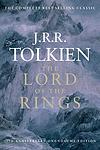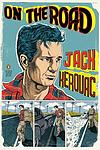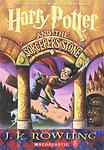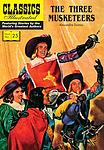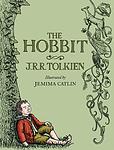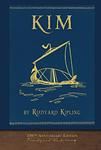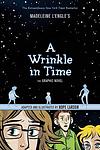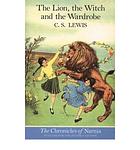The Greatest "Adventure" Books of All Time
Click to learn how this list is calculated.
This list represents a comprehensive and trusted collection of the greatest books. Developed through a specialized algorithm, it brings together 284 'best of' book lists to form a definitive guide to the world's most acclaimed books. For those interested in how these books are chosen, additional details can be found on the rankings page.
Genres
The Adventure genre is characterized by stories that take readers on thrilling journeys filled with danger, excitement, and unexpected twists and turns. These books often feature brave protagonists who embark on quests, explore new territories, and face challenges that test their physical and mental limits. Adventure stories can be set in any time period or location, from ancient civilizations to futuristic worlds, and can include elements of romance, mystery, and suspense. Whether it's a treasure hunt, a survival story, or a battle against evil forces, Adventure books offer readers an escape into a world of excitement and adventure.
Countries
Date Range
Reading Statistics
Click the button below to see how many of these books you've read!
Download
If you're interested in downloading this list as a CSV file for use in a spreadsheet application, you can easily do so by clicking the button below. Please note that to ensure a manageable file size and faster download, the CSV will include details for only the first 500 books.
Download-
1. Moby Dick by Herman Melville
The novel is a detailed narrative of a vengeful sea captain's obsessive quest to hunt down a giant white sperm whale that bit off his leg. The captain's relentless pursuit, despite the warnings and concerns of his crew, leads them on a dangerous journey across the seas. The story is a complex exploration of good and evil, obsession, and the nature of reality, filled with rich descriptions of whaling and the sea.
-
2. Don Quixote by Miguel de Cervantes
This classic novel follows the adventures of a man who, driven mad by reading too many chivalric romances, decides to become a knight-errant and roam the world righting wrongs under the name Don Quixote. Accompanied by his loyal squire, Sancho Panza, he battles windmills he believes to be giants and champions the virtuous lady Dulcinea, who is in reality a simple peasant girl. The book is a richly layered critique of the popular literature of Cervantes' time and a profound exploration of reality and illusion, madness and sanity.
-
3. The Lord of the Rings by J. R. R. Tolkien
This epic high-fantasy novel centers around a modest hobbit who is entrusted with the task of destroying a powerful ring that could enable the dark lord to conquer the world. Accompanied by a diverse group of companions, the hobbit embarks on a perilous journey across Middle-earth, battling evil forces and facing numerous challenges. The narrative, rich in mythology and complex themes of good versus evil, friendship, and heroism, has had a profound influence on the fantasy genre.
-
4. The Adventures of Huckleberry Finn by Mark Twain
The novel follows the journey of a young boy named Huckleberry Finn and a runaway slave named Jim as they travel down the Mississippi River on a raft. Set in the American South before the Civil War, the story explores themes of friendship, freedom, and the hypocrisy of society. Through various adventures and encounters with a host of colorful characters, Huck grapples with his personal values, often clashing with the societal norms of the time.
-
5. Alice's Adventures in Wonderland by Lewis Carroll
This novel follows the story of a young girl named Alice who falls down a rabbit hole into a fantastical world full of peculiar creatures and bizarre experiences. As she navigates through this strange land, she encounters a series of nonsensical events, including a tea party with a Mad Hatter, a pool of tears, and a trial over stolen tarts. The book is renowned for its playful use of language, logic, and its exploration of the boundaries of reality.
-
6. Heart of Darkness by Joseph Conrad
This classic novel follows the journey of a seaman who travels up the Congo River into the African interior to meet a mysterious ivory trader. Throughout his journey, he encounters the harsh realities of imperialism, the brutal treatment of native Africans, and the depths of human cruelty and madness. The protagonist's journey into the 'heart of darkness' serves as both a physical exploration of the African continent and a metaphorical exploration into the depths of human nature.
-
7. The Odyssey by Homer
This epic poem follows the Greek hero Odysseus on his journey home after the fall of Troy. It takes Odysseus ten years to reach Ithaca after the ten-year Trojan War. Along the way, he encounters many obstacles including mythical creatures, divine beings, and natural disasters. Meanwhile, back in Ithaca, his wife Penelope and son Telemachus fend off suitors vying for Penelope's hand in marriage, believing Odysseus to be dead. The story concludes with Odysseus's return, his slaughter of the suitors, and his reunion with his family.
-
8. On the Road by Jack Kerouac
This novel follows the story of a young man and his friend as they embark on a series of cross-country road trips across America during the late 1940s and early 1950s. The protagonist, driven by a desire for freedom and a quest for identity, encounters a series of eccentric characters and experiences the highs and lows of the Beat Generation. The narrative is a testament to the restlessness of youth and the allure of adventure, underscored by themes of jazz, poetry, and drug use.
-
9. Gulliver's Travels by Jonathan Swift
This classic satire follows the travels of a surgeon and sea captain who embarks on a series of extraordinary voyages. The protagonist first finds himself shipwrecked on an island inhabited by tiny people, later discovers a land of giants, then encounters a society of intelligent horses, and finally lands on a floating island of scientists. Through these bizarre adventures, the novel explores themes of human nature, morality, and society, offering a scathing critique of European culture and the human condition.
-
10. Lord of the Flies by William Golding
A group of British boys are stranded on an uninhabited island after their plane crashes during wartime. Initially, they attempt to establish order, creating rules and electing a leader. However, as time passes, their civility erodes, and they descend into savagery and chaos. The struggle for power intensifies, leading to violence and death. The novel explores themes of innocence, the inherent evil in mankind, and the thin veneer of civilization.
-
11. The Hitchhiker's Guide to the Galaxy by Douglas Adams
This comedic science fiction novel follows the intergalactic adventures of an unwitting human, Arthur Dent, who is rescued just before Earth's destruction by his friend Ford Prefect, a researcher for a galactic travel guide. Together, they hitch a ride on a stolen spaceship, encountering a range of bizarre characters, including a depressed robot and a two-headed ex-president of the galaxy. Through a series of satirical and absurd escapades, the book explores themes of existentialism, bureaucracy, and the absurdity of life, all while poking fun at the science fiction genre and offering witty commentary on the human condition.
-
12. The Old Man and the Sea by Ernest Hemingway
An aging Cuban fisherman struggles with a giant marlin far out in the Gulf Stream, isolated from the world and from human help. For days, he fights the marlin alone, admiring its strength, dignity, and faithfulness to its identity—its destiny is as true as his as a fisherman. He finally kills the marlin, but sharks attack and devour it before he can return to the shore. The fisherman returns home empty-handed but remains undefeated, having proven his abilities to himself.
-
13. The Count of Monte Cristo by Alexandre Dumas
A young sailor, unjustly accused of treason, is imprisoned without trial in a grim fortress. After a daring escape, he uncovers a hidden treasure and transforms himself into the mysterious and wealthy Count of Monte Cristo. He then sets out to exact revenge on those who wronged him, using his newfound power and influence. Throughout his journey, he grapples with questions about justice, vengeance, and whether ultimate power can ultimately corrupt.
-
14. Treasure Island by Robert Louis Stevenson
This classic adventure novel tells the story of young Jim Hawkins, who stumbles upon a treasure map and embarks on a perilous journey to find the buried treasure. Along the way, he encounters a host of memorable characters, including the cunning and treacherous Long John Silver. The narrative is filled with action, intrigue, and suspense, as Hawkins and his companions face pirates, mutiny, and other dangers in their quest for the hidden treasure.
-
15. The Wind in the Willows by Kenneth Grahame
"The Wind in the Willows" is a charming tale about the adventures of four anthropomorphic animal friends - Mole, Rat, Badger, and the rebellious and extravagant Toad. The story is set in the idyllic English countryside and explores themes of friendship, exploration, and respect for nature. The narrative is marked by Toad's reckless behavior, his obsession with motor cars, and his eventual redemption. The other characters, with their contrasting personalities, bring balance and depth to the story.
-
16. Lord Jim by Joseph Conrad
The novel revolves around a young, idealistic British seaman, who commits a crime of cowardice at sea. He abandons his ship, leaving hundreds of passengers to their fate. He is publicly censured for this act and spends the rest of his life in shameful obscurity in the South Seas, trying to repress the guilt of his past and regain his lost honor. His quest for redemption leads him to a remote island where he gets a chance to prove his courage, but his tragic flaw ultimately leads to his downfall.
-
17. Harry Potter And The Philosopher's Stone by J. K Rowling
The story follows a young boy, Harry Potter, who learns on his 11th birthday that he is the orphaned son of two powerful wizards and possesses unique magical powers of his own. He is summoned from his life as an unwanted child to become a student at Hogwarts, an English boarding school for wizards. There, he meets several friends who become his closest allies and help him discover the truth about his parents' mysterious deaths, the dark wizard who wants to kill him, and the magical stone that holds immense power.
-
18. The Call of the Wild by Jack London
This book tells the story of a domesticated dog named Buck who is stolen from his home in California and sold into service as a sled dog in Alaska. As he faces harsh conditions and brutal treatment, Buck must learn to adapt to the wild and harsh environment, ultimately reverting to his ancestral instincts in order to survive. The book explores themes of nature versus nurture, civilization versus wilderness, and the struggle for dominance.
-
19. The Three Musketeers by Alexandre Dumas
Set in 17th century France, the novel follows the adventures of a young man who leaves home to join the Musketeers of the Guard. He befriends three of the most daring musketeers, Athos, Porthos, and Aramis, and together, they navigate political intrigue, love affairs, and duels. Their main enemies are the powerful Cardinal Richelieu and the beautiful but treacherous Milady, who will stop at nothing to bring them down.
-
20. Watership Down by Richard Adams
This novel follows a group of rabbits as they flee their warren due to a foreseen catastrophe. The rabbits, led by Hazel and his psychic brother Fiver, face numerous challenges and adventures as they search for a new home. They encounter predators, hostile rabbit communities, and human threats. The book explores themes of leadership, survival, and freedom, all set within the natural world and its inherent dangers.
-
21. The Hobbit by J. R. R. Tolkien
In this fantasy novel, a timid and unadventurous hobbit named Bilbo Baggins is whisked away on a grand adventure by a wizard and a group of dwarves. Their mission is to reclaim the dwarves' homeland and treasure from a fearsome dragon. Throughout the journey, Bilbo grows in courage and cunning, proving himself a true hero as he encounters trolls, goblins, giant spiders, and other perils. The novel culminates with a great battle involving various races of Middle Earth, after which Bilbo returns home, forever changed by his experiences.
-
22. Gargantua and Pantagruel by Francois Rabelais
"Gargantua and Pantagruel" is a satirical and humorous tale of two giants, Gargantua and his son Pantagruel. The narrative is filled with bawdy humor, wordplay, and grotesque and exaggerated characters, reflecting the realities of 16th-century France. The book is also known for its profound insights on education, religion, and politics, often criticizing the corruption and hypocrisy of the powerful. The novel is a rich blend of fantasy, comedy, and philosophical discourse, making it a classic of Renaissance literature.
-
23. Kim by Rudyard Kipling
"Kim" is a thrilling adventure set in India during the height of the British empire. The story follows the life of a young Irish orphan, Kimball O'Hara, who grows up on the streets of Lahore. Kim's life takes a dramatic turn when he becomes involved in the 'Great Game', the political conflict between Russia and Britain in Central Asia. Guided by an old Tibetan Lama on a spiritual quest, Kim is recruited by the British secret service and sent on a dangerous mission across the Himalayas. The novel explores themes of identity, imperialism, and East vs. West.
-
24. A Wrinkle In Time by Madeleine L'Engle
The novel follows the story of a young girl named Meg Murry, her younger brother Charles Wallace, and their friend Calvin O'Keefe as they embark on a cosmic journey to rescue Meg and Charles Wallace's father. The father, a scientist, has been missing since he discovered a new planet using the concept of Tesseract, which is a wrinkle in time. Guided by three mysterious celestial beings, the children travel across different dimensions, face evil forces, and learn about the power of love and self-sacrifice.
-
25. The Lion, The Witch and the Wardrobe by C. S. Lewis
Four siblings are evacuated from London during World War II and sent to live with an old professor in the countryside. In his house, they discover a magical wardrobe that serves as a portal to the land of Narnia, a world filled with mythical creatures and ruled by an evil White Witch. The children are soon caught up in a struggle to free Narnia from the witch's eternal winter, aided by the majestic lion Aslan. The story combines elements of fantasy, adventure, and Christian allegory.
Reading Statistics
Click the button below to see how many of these books you've read!
Download
If you're interested in downloading this list as a CSV file for use in a spreadsheet application, you can easily do so by clicking the button below. Please note that to ensure a manageable file size and faster download, the CSV will include details for only the first 500 books.
Download

